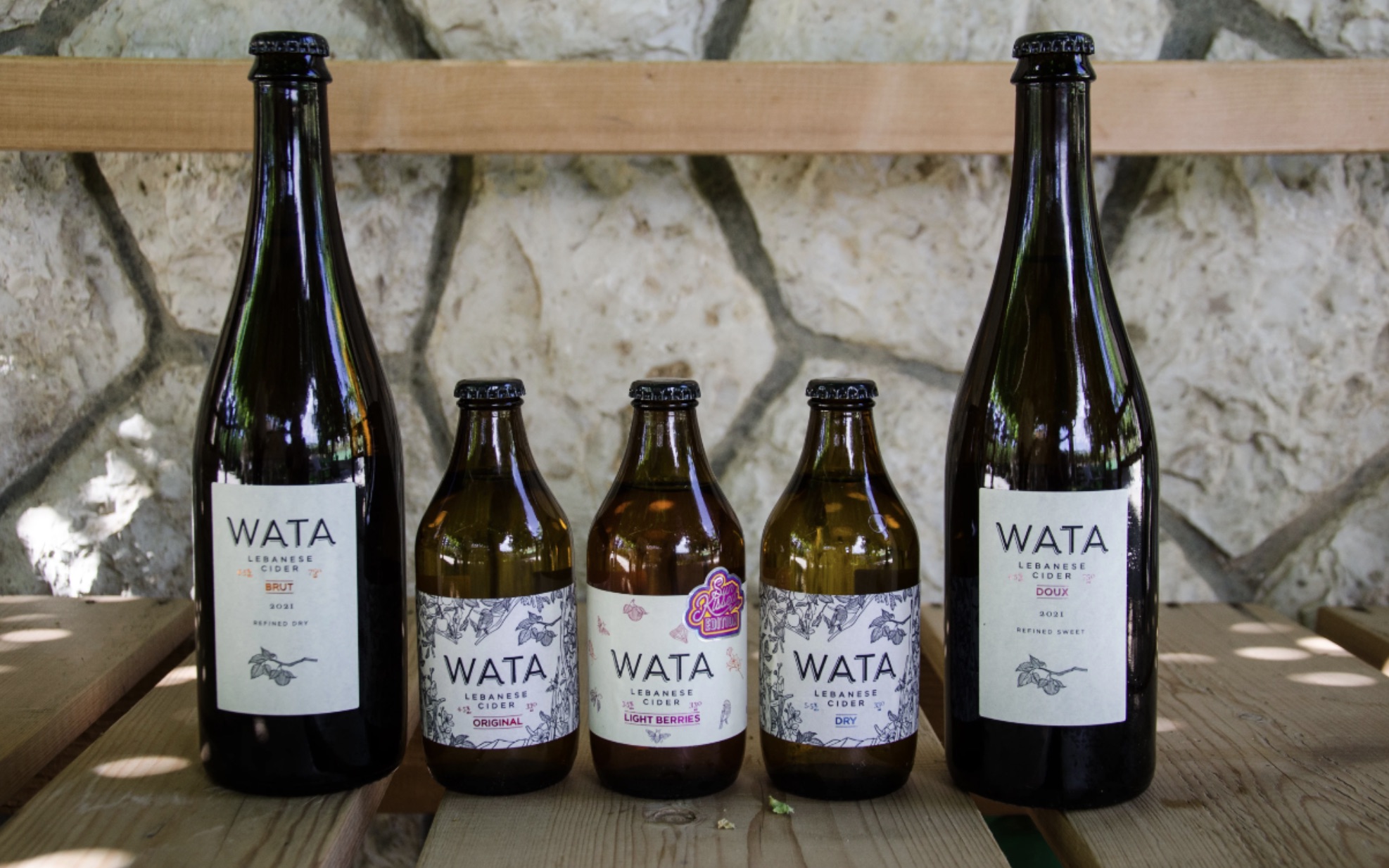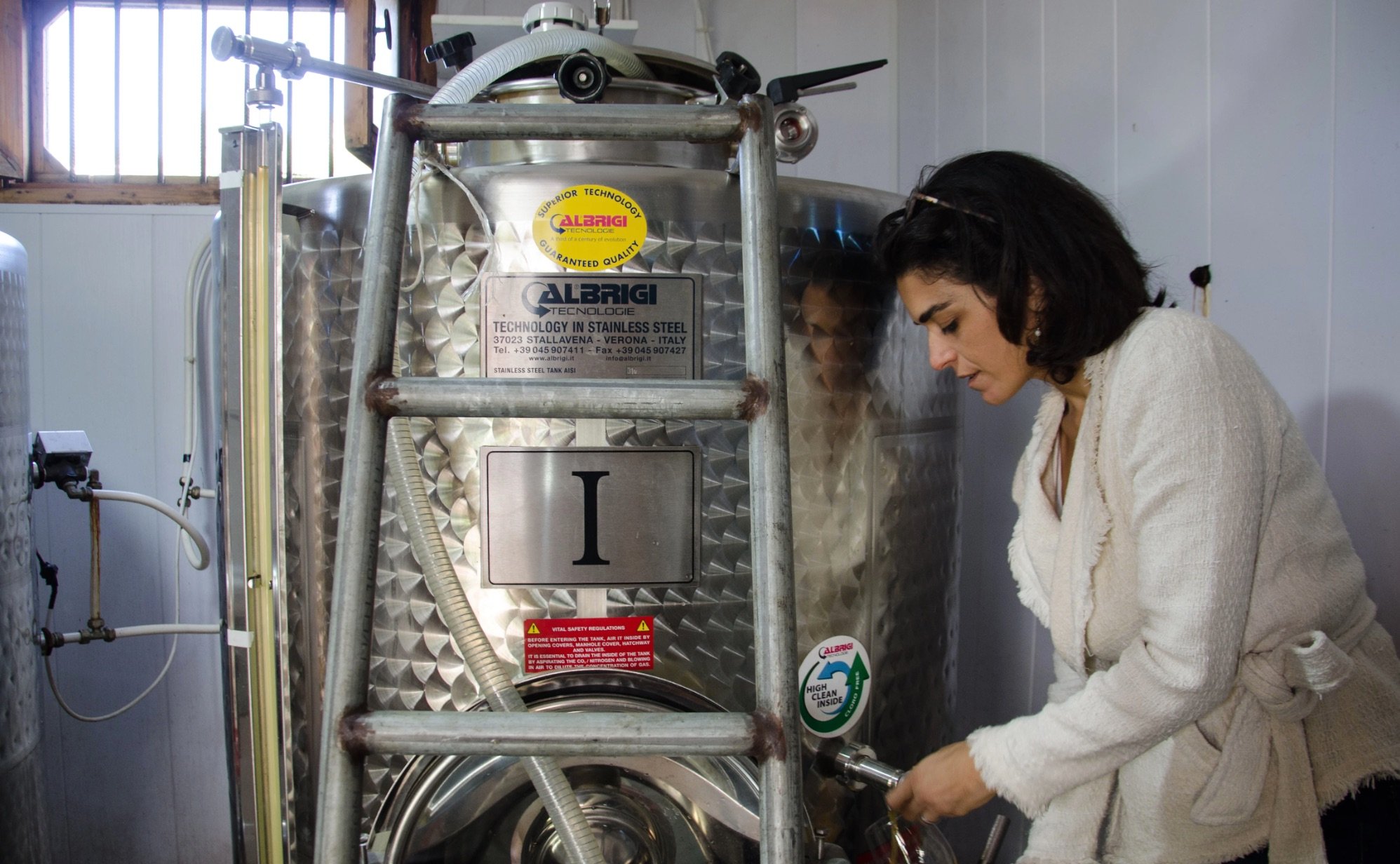
Soha Frem-Karam, founder of the Lebanese cider company WATA. (Credit: Emmanuel Haddad/L'Orient Today)
Located in Wata el-Joz, Kesrouane, the WATA Cider company is a limestone house standing out among walnut-adorned homes. It's surrounded by apple trees and does not have a signpost of any sort.
The house was built by Naoum and Yvette Khalifeh, WATA founder Soha Frem-Karam's grandparents, and is located on an acre of land lined with apples of many varieties and imbued with fond childhood memories.
Since its inception in the summer of 2019, the company has grown significantly.
“We went from producing 7,000 bottles in 2019, with a turnover of $15,000, to 40,000 bottles in 2022 and 2023, generating a turnover of $100,000,” said Frem-Karam, who studied agricultural engineering at the American University of Beirut.
For the past five years, Frem-Karam has worked to carve a market for cider in a country that is unfamiliar with the beverage.
In 2017, she left her position as a project manager at the UN and invested $200,000 of her own funds to launch her cidery.
It had been several years since closed transit points with Syria deprived Lebanese fruit and vegetable producers of Gulf country markets, and apples were in abundance. “A crate of 22 kg of apples, which sold for $12 in the early 2000s, had dropped to $2,” Frem-Karam explained. This is when her entrepreneurial intuition kicked in: “What if cider became the new outlet for Lebanese apples?”
As delicate as wine
While traditional cider is made from non-edible cider apples, new, less astringent forms of cider, made from table apples and similar to sparkling wine, have become more popular.
“There is currently a global growth in these new ciders, gluten-free, lighter in alcohol, with an awareness that cider production is as delicate as wine production,” Frem-Karam explained.
In 2023 the International Wine and Spirits Competition (IWSC) judged ciders for the first time. “WATA won the bronze medal,” Frem-Karam proudly said.
 WATA produces some 40,000 bottles per year. (Credit: Emmanuel Haddad/L'Orient Today)
WATA produces some 40,000 bottles per year. (Credit: Emmanuel Haddad/L'Orient Today)
To captivate Lebanese palates, Frem-Karam spent two years training in Gloucestershire, England, where 40 percent of the world's cider consumers reside. “I then engaged oenologists and think tanks, while simultaneously studying the potential of my apples by conducting micro-fermentations and testing blends with different varieties.”
WATA’s first blend is titled ‘Original.’
Today, WATA produces both ‘dry’ and ‘brut’ cider varieties and its products can be found in select gourmet stores, bars and restaurants throughout Lebanon.
Against the odds
A few months after WATA’s promising start, Lebanon plunged into a severe financial crisis, putting the company’s survival to the test.
“With the devaluation of the Lebanese pound, our 33cl bottles dropped from $2.5 to $0.5, while the 75cl bottles went from $20 to about $5,” recalled Frem-Karam.
If that wasn’t bad enough, the Covid-19 pandemic paralyzed the global economy, forcing many businesses to close down. WATA faced losses, albeit at a limited level, considering they had just started out. Despite this, Frem-Karam made good use of the uncertain times and took to “raising awareness about cider in Lebanon, especially through social media and door-to-door delivery.”
And it paid off.
Since 2021, WATA has doubled its production every year and diversified its range, introducing additional varieties like ‘sweet cider,’ and later ‘light berries,’ made with syrup from the garden's blackberries. The company also expanded its market presence. Currently, 70 percent of WATA’s market is in Lebanon. The remaining 30 percent, amounting to about 12,000 bottles, are exported to bars and gourmet stores in Paris, Oslo, Zurich, and even Australia.
 Soha Frem-Karam, in her micro-cider house in Wata el-Joz. (Credit: Emmanuel Haddad/L'Orient Today)
Soha Frem-Karam, in her micro-cider house in Wata el-Joz. (Credit: Emmanuel Haddad/L'Orient Today)
Prices are still not at their pre-crisis levels, though. “We adjusted our prices to avoid becoming a niche product and even though prices are rising again with dollarization, we have not yet returned to our original prices,” Frem-Karam said. The 75cl 'brut' cider currently costs $12.5, she noted.
For now, Wata is hardly breaking even. To generate profits, the company needs to up its production. This requires expanding the micro-cidery setup, which currently consists of manual presses, two fermentation tanks and a small maturation room at 7 degrees Celsius. As a temporary solution, new fermentation tanks, maturation tanks, and stainless steel mixing tanks will be added to the current cidery, while a new packaging line will be added in the garden.
All this will amount to a $400,000 investment that Frem-Karam made from her own funds. “Not progressing would mean a slow demise,” she said. “'Currently, besides our apples, we buy from three farmers practicing integrated pest management (IPM). In the future, we hope to collaborate with around ten of them.'”
Frem-Karam aims for “a production of 100,000 bottles in 2025 and ultimately, 300,000 bottles. After enjoying launching the business, I now want to see it thrive,” she says.
This article was originally published in French in L'Orient-Le Jour.
- A culinary journey from Beirut to Brussels cooks up tradition, love and teta's recipes
- In Tripoli’s Bab al-Tabbaneh and Jabal Mohsen, ex-rival fighters light up former frontlines with solar energy
- Savvy Element: Finding a niche in the local self-care and home-care market, despite Lebanon’s crisis